Halki (Greece)
Halki (Greek: Χάλκη; alternatively Chalce or Chalki) is a Greek island and municipality in the Dodecanese archipelago in the Aegean Sea, some 9 km (6 mi) west of Rhodes. With an area of 28 km2 (11 sq mi), it is the smallest inhabited island of the Dodecanese. It is part of the Rhodes regional unit.[2] It has a permanent population of 330 (increased during the summer months), concentrated in the only village Emporio. The 2011 census showed a population of 478 inhabitants. The community is divided in two parts, Chorio (Χωριό, also spelled Horio, "Village") and Emporio (Εμποριό, "Market").
Halki
Χάλκη | |
|---|---|
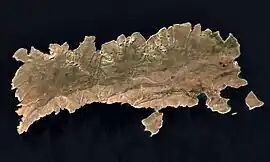 Satellite image of the island | |
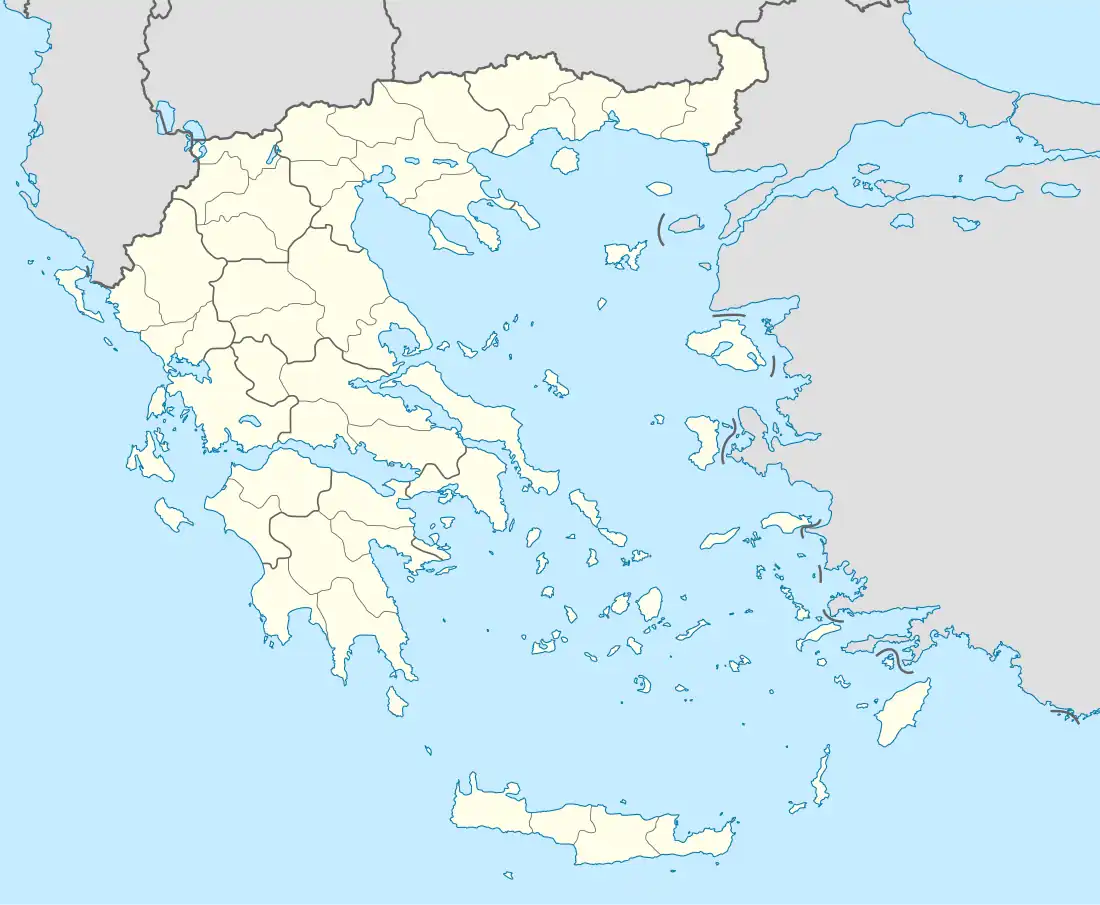 Halki Location within the region 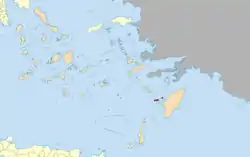 | |
| Coordinates: 36°14′N 27°34′E | |
| Country | Greece |
| Administrative region | South Aegean |
| Regional unit | Rhodes |
| Area | |
| • Municipality | 37.04 km2 (14.30 sq mi) |
| Highest elevation | 601 m (1,972 ft) |
| Lowest elevation | 0 m (0 ft) |
| Population (2011)[1] | |
| • Municipality | 478 |
| • Municipality density | 13/km2 (33/sq mi) |
| Time zone | UTC+2 (EET) |
| • Summer (DST) | UTC+3 (EEST) |
| Postal code | 851 10 |
| Area code(s) | 22460 |
| Vehicle registration | ΚΧ, ΡΟ, ΡΚ |
| Website | www |
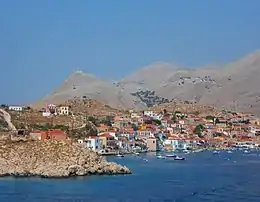
History
The island supported a much larger population but following emigration in the mid-20th century Chorio was almost completely abandoned. A sizable group of the residents moved to Tarpon Springs, Florida, establishing the Greek-American community there that continues to this day. A ruined medieval castle of the Knights of St. John overlooks the old town and the chapel contains some of the original frescoes.
- List of Halki rulers
| Rhodian Hexapolis | 700-408 BC |
| Rhodes | 408-332 BC |
| Macedonian Empire | 332-323 BC |
| Rhodes | 323-164 BC |
| Roman Empire | 164 BC - 395 |
| Byzantine Empire | 395 - 7th century |
| Arabs | 7th century - 825 |
| Byzantine Empire | 825 - 1204 |
| Venice | 1204 - |
| Genoa | - 1523 |
| Ottoman Empire | 1523 - 1912 |
| Italy | 1912–1948 |
| Greece | 1948 |
Municipality
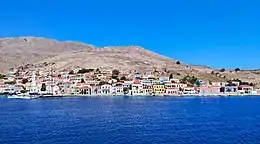
The Municipality of Chalki includes several uninhabited offshore islands, the largest of which is Alimia to the northeast, and has a total land area of 37.043 square kilometres (14.302 sq mi).[3] The island's primary industry is tourism, although fishing is also substantial. There is virtually no natural water supply on the island and rainfall is collected in large cisterns. Drinking water is brought in from Rhodes, but there can be shortages during the summer months due to the increased population. As of 2014 there is a desalination plant on the island and the water boat no longer comes every few days. However, bottled water still arrives.
Solar power
A solar park, currently generating 1.8 gigawatthours of electricity annually, stands as a noteworthy achievement on the island of Halki. Spearheaded by project developer Vassilis Zafiropoulos from Akuo, this initiative is anticipated to markedly diminish the island's carbon footprint, reducing CO2 emissions by an estimated 2,576 tonnes—equivalent to the emissions of 617 conventional cars.[4]
Furthermore, the economic impact is substantial, with €260,000 in savings on green energy production. This amount is deemed sufficient to cover the energy costs for over 200 island families, contributing to a remarkable shift toward sustainable and cost-effective energy solutions.[4]
Resulting in zero-euro electricity bills for households on the island, the project has proven particularly advantageous for small businesses, exemplified by a shop in the port reporting substantial savings. A notable testimonial highlights a substantial reduction from €8,000 to €1,500 in annual electricity costs.[4]
Beyond its impact on individual consumers, the project extends its benefits to the transportation sector, offering free electricity for vehicles on the island, including usage by the local police force.[4]
The success of the Halki model has broader implications, as it serves as a blueprint for replication on numerous other islands in Greece, contributing to the widespread adoption of sustainable energy practices and technological advancements for enhanced community well-being.[4]
People
Dimitris Kremastinos (1942–2020), former Greek Minister of Health (1993–1996)
References
- "Απογραφή Πληθυσμού - Κατοικιών 2011. ΜΟΝΙΜΟΣ Πληθυσμός" (in Greek). Hellenic Statistical Authority.
- "ΦΕΚ A 87/2010, Kallikratis reform law text" (in Greek). Government Gazette.
- "Population & housing census 2001 (incl. area and average elevation)" (PDF) (in Greek). National Statistical Service of Greece.
- "Halki: Greek island serves as model for solar power communities". euronews. 2023-06-07. Retrieved 2023-09-29.
Further reading
- Maria Z. Sigala, Ckalke from the Early Christian Period to the End of the Period of the Knights (5th century - 1523): Monuments, Architecture, Topography, Society, Athens 2011 (unpublished doctoral thesis).
- Maria Z. Sigala, "Kellia on Chalki in the Dodecanese. The date of the wall-paintings and their significance", Deltion of the Christian Archaeological Society 30, Athens 2009, 149-158 (in Greek with an English summary).

